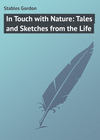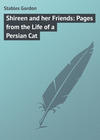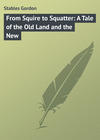Buch lesen: «The Island of Gold: A Sailor's Yarn», Seite 2
Book One – Chapter Three.
“O Eedie, I’ve Found a Child.”
Ransey Tansey took his tiny sister tenderly up and spread her, as it were, on the soft moss.
“She’s in for a regular forenooner, Bob,” said the boy, “and I’m not sure I don’t like Babs just as well when she is asleep. Seems so innercent-like, you know.”
Bob looked as if he really did understand, and tried by means of his brown eyes and that fag-end of a tail to let his master know that he too liked Babs best asleep, because then no attempts were made to gouge his eyes out with pieces of stick, or to ram the business end of a tin whistle halfway down his throat.
“Bob!” said Ransey.
“Yes, master,” said Bob, raising his ears.
“Babs is a sailor’s darter, ye know.”
Bob assented.
“Well, she ought’er sleep in a hammock.”
“To be sure. I hadn’t thought of that,” said Bob.
“I can make one in a brace o’ shakes, and that’s sailor langwidge. Now just keep your eyes on me, Bob.”
Ransey Tansey was busy enough for the next five minutes. He took that shepherd-tartan shawl, and by means of some pieces of string, which he never went abroad without, soon fashioned it into a neat little hammock. Two saplings grew near, and by bending a branch downward from each, he slung that hammock so prettily that he was obliged to stand back for a little while to smile and admire it.
When he lifted Babs and put her in it, and fastened the two sides of the hammock across her chest with some more string and a horse-shoe nail, so that she could not fall out, the whole affair was complete.
“Hush-a-bye, baby, upon the tree-top,
When the wind blown the cradle will rock.”
Well, the wind did blow, but ever so softly, and the little hammock swayed gently to and fro. And the blackbird’s voice seemed to sound more melodiously now; the thrush went farther away; only the wild pigeons continued to coo, coo, and the bees to hum, high, high up in the green beech-tree.
No wonder that the baby slept.
“Come along now, Bob. We’ve a whole hour at least.”
The boy placed his rod and bag on the branches of a tree.
“A whole hour, Bob, to do as we likes. No good me askin’ that idiot of an Admiral to watch Babs. He’d only begin scray-scrayin’ and hopping around the hammock, and Babs would wake. I’m goin’ to run wild for a bit, are you?”
And off he bounded, with Bob at his heels.
The Admiral, whose feet were getting cold now, hopped out of the stream, stretched out his three-foot neck, and looked after them.
“They think they’re going to leave me behind, do they? Tok – tok – tok,” – which in craneish language means “No – no – no.”
So away he went next, with his head and his long neck about a yard in front of him, and his wings expanded. It would have puzzled any one to have told whether the Admiral was running or flying.
If Ransey Tansey climbed one tree he climbed a dozen. Ransey walked through the wood with upturned face, and whenever he saw a nest, whether it belonged to magpie, hawk, or hooded crow, skywards he went to have a look at it.
He liked to look at the eggs best, and sometimes he brought just one down in his mouth if four were left behind, because, he thought, one wouldn’t be missed. But even this was sinful; for although birds are not very good arithmeticians, every one of them can count as far as the number of its eggs – even a partridge or a wren can.
Sometimes the Admiral wanted to investigate the nests, but Ransey sternly forbade him. He might dance round the tree as much as he liked, but he must not fly up.
Bob used to bark at his master as he climbed up and up. Indeed, when perched on the very, very top of a tall larch-tree Ransey himself didn’t look much bigger than a rook.
Yet I think the ever-abiding sorrow with Bob was not that he had not a tail worth talking about, but that he could not climb a tree.
Different birds behaved in different ways when Ransey visited their nests. Thus: a linnet or a robin, flying from its sweet, cosy little home in a bush of orange-scented furze, would sit and sing at no great distance in a half-hysterical kind of way, as if it really didn’t know what it was about. A blackbird from a tall thorn-tree or baby spruce, would go scurrying off, and make the woods resound with her cries of “beet, beet, beet,” till other birds, crouching low on their nests, trembled with fear lest their turn might come next. A hooded crow would fly off some distance and perch on a tree, but say nothing: hooded crows are philosophers. A magpie went but a little distance away, and sat nodding and chickering in great distress. A hawk would course round and round in great circles in the air, uttering every now and then a most distressful scream.
But one day, I must tell you, a large hawk played the lad a very mischievous trick. Ransey was high up near the top of a tall, stone-pine-tree, and had hold of a sturdy branch above, being just about to swing himself in through the needled foliage, when, lo! the stump on which one foot was resting gave way, leaving him suspended betwixt heaven and earth, like Mohammed’s coffin – and kicking too, because he could not for some time swing himself into the tree.
Now that hawk needn’t have been so precious nasty about it. But he saw his chance, and went for Ransey straight; and the more the boy shouted at the hawk, and cried “Hoosh-oo!” at him, the more that hawk wouldn’t leave off. He tore the boy’s shirt and back, and cut his suspender right through, so that with the kicking and struggling his poor little pants came off and fluttered down to the ground.
Ransey Tansey was only second best that day, and when – a sadder and a wiser boy – he reached the foot of the tree, he found that Bob had been engaged in funeral rites – obsequies – for some time. In fact, he had scraped a hole beneath a furze bush and buried Ransey’s pants.
Whether Bob had thought this was all that remained of his master or not, I cannot say. I only state facts.
But to hark back: after Ransey Tansey had seen all the nests he wanted to see, he and his two companions rushed off to a portion of the wood where, near the bank of the stream, he kept his toy ship under a moss-covered boulder.
He had built this ship, fashioning her out of a pine-log with his knife, and rigged her all complete as well as his somewhat limited nautical knowledge permitted him to do. In Ransey’s eyes she was a beauty – without paint.
Before he launched her to-day he looked down at Bob and across at the Admiral, who was quite as tall as the boy.
“We’re going on a long and dangerous voyage, Bob,” he said. “There’s no sayin’ wot may happen. We may run among rocks and get smashed; we may get caught-aback-like and flounder,” – he meant founder – “or go down wi’ all han’s in the Bay o’ Biscay – O.”
Bob tried to appear as solemn and sad as the occasion demanded, and let his fag-end drop groundwards.
But the crane only said “Tok,” which on this occasion meant “All humbug!” for he knew well enough that Ransey Tansey was seldom to be taken seriously.
Never mind, the barque was launched on the fathomless deep, the summer breeze filled her sails – which, by the way, had been made out of a piece of an old shirt of the boy’s father’s – and she breasted the billows like a thing of life.
Then as those three young inseparables rushed madly and delightedly along the bank to keep abreast of the ship, never surely was such whooping and barking and scray-scraying heard in the woods before.
But disaster followed in the wake of that bonnie barque on this voyage. I suppose the helmsman forgot to put his helm up at an ugly bend of the river, so the wind caught her dead aback. She flew stern-foremost through the water at a furious rate, then her bows rose high in air, she struggled but for a moment ere down she sank to rise no more, and all on board must have perished!
When I say she sank to rise no more I am hardly in alignment with the truth.
The fact is, that although Ransey Tansey could easily have made another ship with that knife of his, he was afraid he could not requisition some more shirt for sails.
“Oh, I ain’t agoin’ to lose her like that, Bob,” said Ransey.
Bob was understood to say that he wouldn’t either.
“Admiral, ye’re considerabul longer nor me in the legs and neck; couldn’t ye wade out and make a dive for her?”
The crane only said, “Tok!”
By this time Ransey was undressed.
“Hoop!” he cried, “here goes,” and in he dived.
“Wowff!” cried Bob, “here’s for after,” and in he sprang next.
“Kaik – kaik!” shrieked the crane, and followed his leader, but he speedily got out again. The water was deep, and as a swimmer the Admiral was somewhat of a failure.
But the barque was raised all and whole, and after a good swim Ransey and Bob returned to the bank. Bob shook himself, making little rainbows all round him, and the boy rolled in the moss till he was dry, but stained rather green.
Then he dressed himself, and looked at his watch – that is, he looked at the sun.
“Why, Bob,” he cried, “it is time to go back to Babs.”
It was such a lovely forenoon that day that the elderly Miss Scragley thought a walk in the woods and wilds – as she phrased it – would do her good. So she took her little six-year-old niece Eedie with her, and started.
The butler wanted to know if he would send a groom with her. But she declined the service.
“It is ever so much better,” she told Eedie, “going all alone and enjoying things, than having a dressed-up doll of a flunkey dawdling behind you carrying wraps.”
I think Miss Scragley was right.
The Scragleys were a very old family, and that was their mansion I have already mentioned as standing high up on the hill in a cloudland of glorious trees. But excepting Miss Scragley herself, and this little niece, Miss Eedie Moore, the rest of the Scragleys were all dead and away.
Though the family estates were intact and financially secure, afflictions of all sorts had decimated the Scragleys. No less than two had died on the hunting-field; one, a soldier, had fallen on the field of fame in far Afghanistan; another, a captain in the royal navy, had succumbed to fever at sea; and still another had sailed away in a ship that never returned.
Others had died in peace and at home. So Miss Scragley was indeed a relic of the past, but she was lord of the manor for the time being. Her heart was bound up in little Eedie; and the girl would have to change her name when of age, as she would then be heir to all the Scragley estates. Even if she married, her husband must become a Scragley. It would never do to let the glorious name of Scragley die out.
But Miss Scragley was somewhat antiquated though not very old; somewhat set up and starchy in manner too. She preferred to import good people from London to mixing with the residents around, with the exception of the kindly-faced, white-haired old rector, Captain Weathereye, R.N., and Dr Fairincks.
In bygone ages it was currently believed that this rough old sea-dog of a captain, Weathereye would lead the then graceful Miss Scragley to the altar, and the lady herself still believed that the happy event would yet come off.
And she was quite gay when she thought of it. At Christmas-time, when she imported more good people from London than usual, and turned on the family ghost for the occasion, when she had the special brand of port decanted that old Weathereye so dearly loved, and when Scragley Hall resounded with mirth and laughter, and was lighted up from basement to attics, Miss Scragley nursed the fond hope that the captain was almost sure to pop the question.
Old Captain Weathereye praised the port. But – well, he loved to hear corks popping, only he wouldn’t pop himself.
Poor Miss Scragley!
“I wonder will he ever?” she used to remark to herself, when she had finished saying her prayers and was preparing to undress – “ever —ever?”
“Never – never,” old Weathereye would have unfeelingly replied had he heard her.
On this particular occasion Miss Scragley extended her walk far into the very wood – forest, she romantically called it – where Ransey Tansey and his pets were enjoying themselves.
She and her niece wandered on and on by the banks of the stream, till they came to the place where little Babs lay, still sound asleep in her hammock, and this was swaying gently to and fro in the summer wind.
“O Eedie!” cried Miss Scragley, “why, I’ve found a child!”
“Oh, the wee darling!” exclaimed Eedie; “mayn’t I kiss it, auntie?”
“If you kissed it,” said the lady, as if she knew all about babies and could write a book about them – “if you kissed it, dear, it would awake, and the creature’s yells would resound through the dark depths of the forest.”
“But there is no one near,” she continued; “it must be deserted by its unfeeling parents, and left here to perish.”
She went a little nearer now and looked down on the sleeping child’s face.
A very pretty face it was, the rosy lips parted, the flush of sleep upon her face; and one wee chubby hand and arm was lying bare on the shawl.
“Oh dear!” cried Miss Scragley, “I feel strangely agitated. I cannot let the tiny angel perish in the silvan gloom. I must —you must, Eedie – well, we must, dear, carry it home with us.”
“Oh, will ye, though?” The voice was close behind her. “Just you leave Babs alone, and attend to yer own bizness, else Bob will have somethin’ till say to ye.”
Miss Scragley started, as well she might.
“Oh,” she cried, looking round now, “an absurd little gipsy boy!”
“Yes,” said Ransey Tansey, touching his forelock, “and I’m sorry for bein’ so absurd. And ashamed all-so. If a rabbit’s hole was handy, I’d soon pop in. But, bless yer beautiful ladyship, if I’d known I was to ’ave the perleasure o’ meetin’ quality, I’d ’ave put on my dress soot, and carried my crush hat under my arm.
“Don’t be afeard, mum,” he continued, as the crane came hopping out of the bush. “That’s only just the Admiral; and this is Bob, as would die for me or Babs.”
“And who is Babs, you droll boy?”
“Babs is my baby, and no one else’s ’cept Bob’s. And Bob and I would make it warm for anybody as tried to take Babs away. Wouldn’t us, Bob?”
Just then his little sister awoke, all smiles and dimples as usual.
Ransey Tansey went to talk to her, and for a time the boy forgot all the world except Babs.
Book One – Chapter Four.
“Ransey, Fetch Jim; We’re Goin’ On.”
“I’se glad ’oo’s tome back, ’Ansey. Has I been afeep (asleep), ’Ansey?”
“Oh, yes; and now I’m goin’ to feed Babs, and Babs’ll lie and look at the trees till I cook dinner for Bob and me.”
“That wady (lady) won’t take Babs away, ’Ansey?”
“No, Babs, no.”
Ransey Tansey fed Babs once more from the pickle bottle with the horn spoon, much to Miss Scragley’s and little Eedie’s astonishment and delight.
Then he commenced to build a fire at a little distance, and laid out some fish all ready to cook as soon as the blazing wood should die down to red embers.
“You’re a very interesting boy,” said Miss Scragley politely. “May I look on while you cook?”
“Oh, yes, mum. Sorry I ain’t got a chair to offer ye.”
“And oh, please, interesting boy,” begged Eedie, “may I talk to Babs?”
“Cer – tain – lee, pretty missie. – Babsie, sweet,” he added, “talk to this beautiful young lady.”
“There’s no charge for sittin’ on the grass, mum,” said Ransey the next minute.
And down sat Miss Scragley smiling.
The boy proceeded with the preparation of the meal in real gipsy fashion. He cooked fish, and he roasted potatoes. He hadn’t forgotten the salt either, nor a modicum of butter in a piece of paper, nor bread; and as he and Bob made a hearty dinner, he gave every now and then the sweetest of tit-bits to Babs.
Eedie and the child got on beautifully together.
“May I ask you a question or two, you most interesting boy?” said Miss Scragley.
“Oh, yes, if ye’re quite sure ye ain’t the gamekeeper’s wife. The keeper turned me out of the wood once. Bob warn’t there that day.”
“Well, I’m sure I’m not the gamekeeper’s wife. I am Miss Scragley of Scragley Hall.”
The boy was wiping his fingers and his knife with some moss.
“I wish I had a cap on,” he said.
“Why, dear?”
“So as I could take her off and make a bow,” he explained.
“And what is your name, curious boy?”
“Ransey; that’s my front name.”
“But your family name?”
“Ain’t got ne’er a family, ’cepting Babs.”
“But you have a surname – another name, you know.”
“Ransey Tansey all complete. There.”
“And where do you live, my lad?”
“Me and Babs and Bob and Murrams all lives, when we’re to home, at Hangman’s Hall; and father lives there, too, when ’ee’s to home; and the Admiral, yonder, he roosts in the gibbet-tree.”
“And what does father do?”
“Oh, father’s a capting.”
“A captain, dear boy?”
“No, he’s not a boy, but a man, and capting of the Merry Maiden, a canal barge, mum. An’ we all goes to sea sometimes together, ’cepting Murrams, our pussy, and the Admiral. We have such fun; and I ride Jim the canal hoss, and Babs laughs nearly all the time.”
“So you’re very happy all of you, and always were?”
“Oh, yes – ’cepting when father sometimes took too much rum; but that’s a hundred years ago, more or less, mum.”
“Poor lad! Have you a mother?”
“Oh, yes, we has a mother, but only she’s gone dead. The parson said she’d gone to heaven; but I don’t know, you know. Wish she’d come back, though,” he added with a sigh.
“I’m so sorry,” said Miss Scragley, patting his hand.
“Oh, don’t ye do that, mum, and don’t talk kind to me, else I’ll cry. I feels the tears a-comin’ now. Nobody ever, ever talks kindly to me and Babs when at home, ’cepting father, in course, ’cause we’re on’y common canal folks and outcasts from serciety.”
Ransey Tansey was very earnest. Miss Scragley had really a kind heart of her own, only she couldn’t help smiling at the boy’s language.
“Who told you so?”
“W’y, the man as opens the pews.”
“Oh, you’ve been to church, then?”
“Oh, yes; went the other Sunday. Had nuthin’ better to do, and thought I’d give Babs a treat.”
“And did you go in those – clothes?”
“Well, mum, I couldn’t go with nuthin’ on – could I, now? An’ the pew-man just turned us both out. But Babs was so good, and didn’t cry a bit till she got out. Then I took her away through the woods to hear the birds sing; and mebbe God was there too, ’cause mother said He was everywhere.”
“Yes, boy, God is everywhere. And where does your mother sleep, Ransey?”
“Sleep? Oh, in heaven. Leastways I s’pose so.”
“I mean, where was your gentle mother buried?”
“Oh, at sea, mum. Sailor’s grave, ye know.”
Ransey looked very sad just then.
“You don’t mean in the canal, surely?”
“Yes, mum. Father wouldn’t have it no other way. I can’t forget; ’tain’t much more’n a year ago, though it looks like ten. Father, ye know, ’ad been a long time in furrin parts afore he was capting o’ the Merry Maiden.”
The lad had thrown himself down on the grass at a respectable distance from Miss Scragley, and his big blue, eyes grew bigger and sadder as he continued his story.
“’Twere jest like this, mum. Mother’d been bad for weeks and so quiet like, and father so kind, ’cause he didn’t never touch no rum when mother was sick. We was canal-ing most o’ the time; and one night we stopped at the ‘Bargee’s Chorus’ – only a little public-house, mum, as perhaps you wouldn’t hardly care to be seen drinkin’ at. We stopped here ’cause mother was wuss, and old dad sent for a doctor; and I put Jim into the meadow. Soon’s the doctor saw poor mother, he sez, sez he, ‘Ye’d better get the parson. No,’ he sez, ‘I won’t charge ye nuthin’ for attendance; it’s on’y jest her soul as wants seein’ to now.’
“Well, mum, the parson came. He’d a nice, kind face like you has, mum, and he told mother lots, and made her happy like. Then he said a prayer. I was kind o’ dazed, I dussay; but when mother called us to her, and kissed me and Babs, and told us she was goin’ on to a happier land, I broke out and cried awful. And Babs cried too, and said, ‘An’ me too, ma. Oh, take Babs.’
“Father led us away to the inn, and I jest hear him say to the parson, ‘No, no, sir, no. No parish burial for me. She’s a sailor’s wife; she’ll rest in a sailor’s grave!’
“I don’t know, mum, what happened that night and next day, for me and Babs didn’t go on board again.
“Only, the evenin’ arter, when the moon and stars was ashinin’ over the woods and deep down in the watur, father comes to me.
“‘Ransey,’ sez father, ‘fetch Jim; we’re goin’ on.’ And I goes and fetches Jim, and yokes him to and mounts; and father he put Babs up aside me, ’cause Jim’s good and never needs a whip.
“‘Go on, Ransey,’ sez he, an’ steps quietly on board and takes the tiller.
“Away we went – through the meadows and trees, and then through a long, quiet moor.
“Father kep’ the barge well out, and she looked sailin’ among the stars – which it wasn’t the stars, on’y their ’flection, mum. Well, we was halfway through the moor, and Babs was gone sound asleep ’cross my arm, when I gives Jim his head and looks back.
“An’, oh, mum, there was old dad standin’ holdin’ the tiller wi’ one hand. The moon was shinin’ on his face and on his hair, which is grey kind, and he kep’ lookin’ up and sayin’ somethin’.
“Then there was a plash. Oh, I knew then it was dead mother; and – and – I jest let Jim go on – and – and – ”
But Ransey’s story stopped right here. He was pursing up his lips and trying to swallow the lump in his throat; and Miss Scragley herself turned her head away to hide the moisture in her eyes.
Grief does not stay long at a time in the hearts of children. It comes there all the same, nevertheless, and is quite as poignant while it does last as it is in the breasts of older folks. Children are like the traditional April day – sunshine and showers.
“I think, mum,” said Ransey after a while, “it is time for us to bundle and go.”
Miss Scragley watched the lad with considerable interest while he struck his little camp. First he scattered the remains of his fire and ashes carefully, so that there should be no danger to the wood. Then he prepared to hide his ship.
“Did you make that pretty ship?” said Eedie.
“Oh, yes; I can make beautiful ships and boats, ’cause I seed lots on ’em w’en father took me to Southampton. Oh, that seems millions and millions o’ years ago. And ye see, miss,” he added, “I’m goin’ to be a sailor anyhow, and sail all over the wide world, like father did, and by-and-by I’ll be rich enough to have a real ship of my own.”
“Oh, how nice! And will Babs go with you?”
“As long as Babs is quite little,” he answered, “I can’t go to sea at all, ’cause Babs would die like dead mother if I went away.”
He had Babs in his arms by this time, and it was evident enough that the affection between these two little canal people was very strong indeed.
Seated on his left shoulder, and hugging Ransey’s head towards her, Babs evidently thought she was in a position to give a harangue.
She accordingly addressed herself to Eedie: —
“My bloder ’Ansey is doin’ to drow a big, big man. As big as dad. My bloder ’Ansey is doin’ to be a sailor in s’ips, and Babs is doin’. ’Oo mufn’t (mustn’t) take my bloder away from Babs. ’Oor mudder mufn’t, and noboddy mufn’t.”
Meanwhile her brother was nearly strangled by the vehemence of her affection. But he gently disengaged the little arm and set her on the moss once more. He speedily enveloped her in the shawl, and then hoisted her on his back.
Next he hung his bag in front, and handed the fishing-rod to Bob.
“We must all go now, lady.”
“Oh, yes, and we too must go. We have to thank you for a very interesting half-hour.”
Ransey wasn’t used to such politeness as this little speech indicated. What to say in reply did not readily occur to him.
“Wish,” he said awkwardly and shyly, “I could talk as nice like as you and t’other young lady.”
Miss Scragley smiled. She rather liked being thought a young lady even by a little canal boy like Ransey.
“Oh, you will some day. Can you read?”
“Ye-es. Mother taught me to read, and by-and-by I’ll teach Babs like one o’clock. I can read ‘Nick o’ the Woods’ and the ‘Rev’lations o’ Saint John;’ but Babs likes ‘Jack the Giant Killer’ better’n the Bible. An’ oh,” he added, somewhat proudly, “I got a letter to-day, and I could read that; and it was to say as how father was comin’ home in four days. And the postman cheeked us, and shook his head, threat’nin’ like, and I threw a big turmut and broke it.”
“What! broke his head?”
“Oh, no, mum, only jest the turmut. An’ Bob went after him, and down went postie. Ye would have larfed, mum.”
“I’m afraid you’re a bad boy sometimes.”
“Yes, I feels all over bad – sometimes.”
“I like bad boys best,” said Eedie boldly, “they’re such fun.”
“Babs,” said Ransey, “you’ll hang me dead if you hold so tight.”
“Well, dears, I’m going to come and see you to-morrow, perhaps, or next day, and bring Babs a pretty toy.”
“Babs,” said the child defiantly, “has dot a dolly-bone, all dlessed and boo’ful.” This was simply a ham-bone, on the ball of which Ransey had scratched eyes and a mouth and a nose, and dressed it in green moss and rags. And Babs thought nothing could beat that.
As she rode off triumphantly on Ransey’s back, Babs looked back, held one bare arm on high, and shouted, “Hullay!”
“What strange children!” said Miss Scragley to her niece. “They’re not at all like our little knights of the gutter down in the village where we visit. This opens up life to me in quite a new phase. I’m sure Captain Weathereye would be much interested. There is good, in those poor canal children, dear, only it wants developing. I wonder how we could befriend them without appearing officious or obtrusive. Consult the captain, did you say?”
“I did not speak at all, aunt.”
“Didn’t you? However, that would be best, as you suggested.”
Miss Scragley did not call at Hangman’s Hall next day – it looked showery; but about twelve o’clock, while Ransey Tansey was stewing that leveret with potatoes and a morsel of bacon, and Babs was nursing her dolly-bone in the bassinette, where Ransey had placed her to be out of the way, some one knocked sharply and loudly at the door.
The Admiral, swaying aloft in the gibbet-tree, sounded his tocsin, and Bob barked furiously.
“Down, Bob!” cried Ransey, running to the door. He half expected the postman.
He was mistaken, however, for there stood a smart but pale-faced flunkey in a brown coat with gilt buttons.
Now Ransey could never thoroughly appreciate “gentlemen’s gentlemen” any more than he could gamekeepers.
The flunkey had a large parcel under his arm, which he appeared to be rather ashamed of.
“Aw!” he began haughtily, “am I right in my conjecture that this is ’Angman’s ’All?”
“Your conjecture,” replied Ransey, mimicking the flunkey’s tone and manner, “is about as neah wight as conjectures gener’ly aw. What may be the naychure of your business?”
“Aw! An’ may I enquiah if you are the – the – the waggamuffin who saw Miss Scwagley in the wood yestah-day?”
“I’m the young gentleman” said Ransey, hitching up his suspender, “who had the honah of ’alf an hour’s convehsation with the lady. I am Ransey Tansey, Esq., eldest and only son of Captain Tansey of the Mewwy Maiden. And,” he added emphatically, “this is my dog Bob.”
Bob uttered a low, ominous growl, and walked round behind the flunkey on a tour of inspection.
The only comfort the flunkey had at that moment arose from the fact that his calves were stuffed with hay.
“Aw! Beautiful animal, to be shuah. May I ask if this is the doag that neahly killed the postman fellah?”
“That’s the doag,” replied Ransey, “who would have killed the postman fellah dead out, if I had tipped him the wink.”
“Aw! Well, my business is vewy bwief. Heah is a pawcel from Miss Scwagley, of which she begs your acceptance.”
“Ah, thank you. Dee – lighted. Pray walk in. Sorry my butler is out at pwesent. But what will you dwink – sherry, port, champagne – wum? Can highly wecommend the wum.”
“Oh, thanks. Then I’ll have just a spot of wum.”
Ransey brought out his father’s bottle – a bottle that had lain untouched for a long time indeed – and his father’s glass, and the flunkey drank his “spot,” and really seemed to enjoy it.
Ransey opened the door for him.
“Convey my best thanks to Miss Scwagley,” he said, “and inform her that we will be ree – joiced to receive her, and that Miss Tansey and myself will not fail to return the call at a future day. Good mo’ning.”
“Good mawning, I’m shuah.”
And the elegant flunkey lifted his hat and bowed.
Ransey ran in, gave the leveret stew just a couple of stirs to keep it from burning, then threw himself into his father’s chair, stretched out his legs, and laughed till the very rafters rang.




















